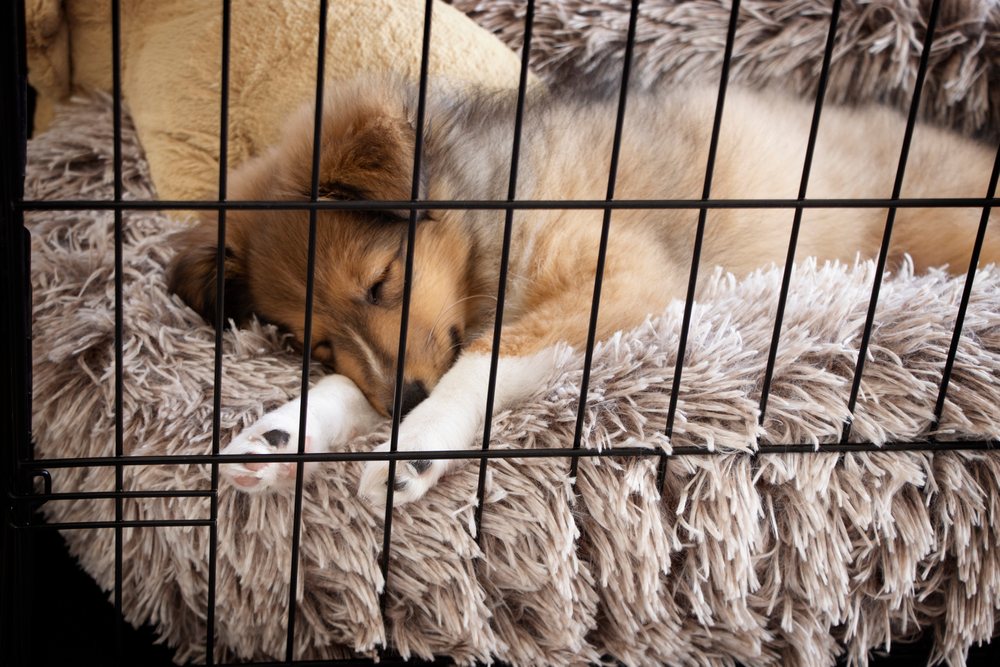The Easy Way to Crate Train a Puppy

Puppies are full of curiosity and wonder, and are, of course, always getting into things. During your little one’s first few months, much goes into their training and socialization. A big part of this is training them to “potty outside” rather than in the living room. One of the best tools of the trade in puppy training is the crate.
You may wonder if you should crate train your puppy. The team at Oakland Veterinary Referral Services gives you the lowdown on the easy way to crate train a puppy with great results.
Simple Steps to Crate Train a Puppy
Some pet owners are reluctant to use a crate because they think they’re cruel. In fact, most dogs gravitate towards them as their dog “den” or private space. These mock dens let a dog feel secure and safe while they sleep or rest. A crate also gives you the opportunity to practice leaving your puppy alone for short periods of time, to avoid separation anxiety in adulthood.
Crate training goes hand in hand with house training because puppies do not want to soil their sleeping area. For puppies, it gives them an understanding of the right place to potty. When you cannot supervise your young pup, the crate is a wonderful place for them to be while you are working or busy.
For successful crate training, follow these recommendations.
- Make the crate an enticing place to be – Introduce your puppy to their new crate by making it a fun place. Add their favorite toys, a blanket, and some treats. The first few weeks of using the crate, plan on feeding your puppy in it to make the experience a positive one. Praise your puppy for going into the crate and playing or eating their meal there. Here are tips for the right crate size and material for your puppy.
- Gradually increase their time inside – The first week, leave the door of the crate open while they get used to it. Then, close the gate for a period of up to 10 minutes at a time. It’s best to do this while your pet’s eating or chewing on a dental treat. Continue to reward with verbal praise when your furry pal relaxes in their den. As they become acclimated, leave them alone in the crate while you run errands or are in the other room for an hour. Continue to increase the time your puppy is in the crate while monitoring how they do.
- Leave your puppy in the crate at night – Teach them that the crate is your puppy’s bed, and that at day’s end, it’s time to go to their bed and sleep. Remember that a puppy cannot hold their bladder for longer than 4 hours or so, depending on their age. Plan on setting an alarm to get up and take your pet outside one or two times in the night.
- Resist the urge to let them out when they cry or whine – We understand it can seem upsetting when your furry loved one cries in their crate. But if you give in, they won’t get to experience the security and positive aspects of having their own little den. Make sure they have things to do, like a treat dispensing puzzle or a chew toy, while they are there and don’t overreact to their excitement when you open the door. Make it so that it becomes a normal aspect of the day to stay in the crate for a few hours.
Remember to Avoid These Crate Training Mistakes
First time puppy owners may not be using the crate in a way that encourages their pet to see it as a safe space and use it. For example, some owners will punish their pet for doing something they shouldn’t have by sticking them in confinement. This will create a negative association with being there, which is not what you want. Instead, make the crate an exciting place to be with lots of incentives.
Another problem that creates fear of the crate is when the pet is left in the crate too long. The longest period of time a young puppy should be in their den is 4 hours. Over time, as they develop, you can keep them in there for longer periods and then for the night, but young puppies need to go outdoors to avoid having an accident in their crate.
Are you in the process of crate training your puppy? We’d love to know how it’s going. You’ll be happy you took the time to learn how to crate train a puppy! (It’s also a perfect way to ease your pet into traveling with you.) If you have any questions or concerns, please do not hesitate to call us.


